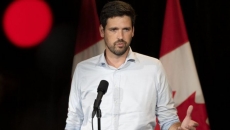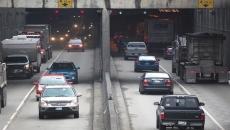The federal government estimates it will need to pay almost $3.4 billion for its share of the disaster recovery bills for flooding and landslides that devastated British Columbia's Fraser Valley in November 2021.
But more than two years after that disaster occurred, only about 40 per cent of that has been paid.
"Our communities need this funding now," said Brad Vis, the Conservative MP for the sprawling, crescent-shaped riding of Mission—Matsqui—Fraser Canyon.
The need is massive, Vis said in an interview with The Canadian Press: from farmers looking to recover lost blueberry crops and rebuild devastated dairy farms, to homeowners whose houses were washed away, to local and provincial efforts to restore roads, bridges and culverts.
One year would be a "reasonable amount of time" for disaster money to flow, Vis said, allowing for engineering plans to be drafted and reviewed by both the local and federal governments.
Any longer and the area remains even more vulnerable to the next storm, he added. Indeed, less than a year would be ideal, "because we don't know what's going to happen the year after."
Southern B.C. was hit by an atmospheric river — the kind of rainstorm that triggered the 2021 disaster — in both 2022 and 2023, and fresh downpours prompted another flood warning in January.
But some of the area's infrastructure still hasn't been fixed, Vis said.
In 2022, an advisory panel — tasked by Ottawa to guide a national plan to better prepare for the impact of climate change — also recommended a timeline of a year or less to ensure disaster-hit communities are promptly "made whole."
But an analysis of data on the federal Disaster Financial Assistance Arrangements program, or DFAA, shows it takes on average seven years for all disaster aid to flow — and as long as 10 to 15 years in several cases.
The data was provided by the office of Emergency Preparedness Minister Harjit Sajjan. Later this year Sajjan is set to publish an updated DFAA program, following several years of consultation.
Among the changes expected in that overhaul are a focus on flowing money faster, as well as projects that don't just restore previous infrastructure but make them more resilient to future disasters.
"We know that we need to do more and we are," Sajjan told a security and defence conference last week in Ottawa.
The program was created in 1970 to better share the recovery costs for natural disasters between the federal government and provinces and territories.
The provinces or territories pay a deductible based on their population, and the federal government pays an increasing share of the bills the higher they go. On average, Ottawa funds about 82 per cent of the recovery costs following a disaster.
The program covers some costs for governments, private homeowners, farmers and businesses, and can include everything from evacuations and emergency medical and security needs to rebuilding and cleanup.
Between 1970 and 2023, 283 disasters have resulted in claims under DFAA. About half have been for flooding, and almost one-third for rainstorms or major storms such as hurricanes.
Wildfires account for less than 10 per cent of events since 1970, but are on the increase, accounting for almost one-fifth of all claims since 2010. Six wildfire claims were made in 2023, the worst fire season in Canada's history.
Wildfires also cost more, averaging $67 million per claim compared with $29 million for flooding and $35 million for major storms.
Between 1970 and 2016, it took an average of seven years for claims to be fully paid. Six claims from before 2016 remain open, the oldest being a rainstorm and flooding in Saskatchewan in 2014.
Since 2017, 29 events resulted in claims and all but one remain open claims. Saskatchewan wildfires in 2017 are in the "final audit" stage.
Climate change has increased the frequency and severity of natural disasters in Canada, and the claims for disaster assistance are growing exponentially. One-third of the claims have been made in just the last 13 years, including 10 per cent just since 2020.
DFAA has paid out $8.5 billion to date, and 70 per cent of that is since 2010, a number that will rise because there are billions of dollars still owing for 35 claims since 2010.
For the major fires and storms in B.C. in 2021, Ottawa estimates its DFAA share will be $403 million and $3.4 billion respectively. To date $207 million has been paid for the fires and $1.4 billion for the November storms.
In a letter to Vis last month, Abbotsford Mayor Ross Siemens said he's grateful for the support to date, but that the recovery bills are mounting. He said more than 300 city-owned sites were damaged in the November 2021 deluge.
"Despite making significant progress on these recovery projects, there is still a lot of important work that needs to be done to ensure our families, farmers, businesses and our provincial food system remains secure," Siemens wrote.
Requests for funding, including interim payments, must come from the province and will be "processed immediately" including a review by federal auditors, a spokeswoman for Sajjan said in an emailed statement.






